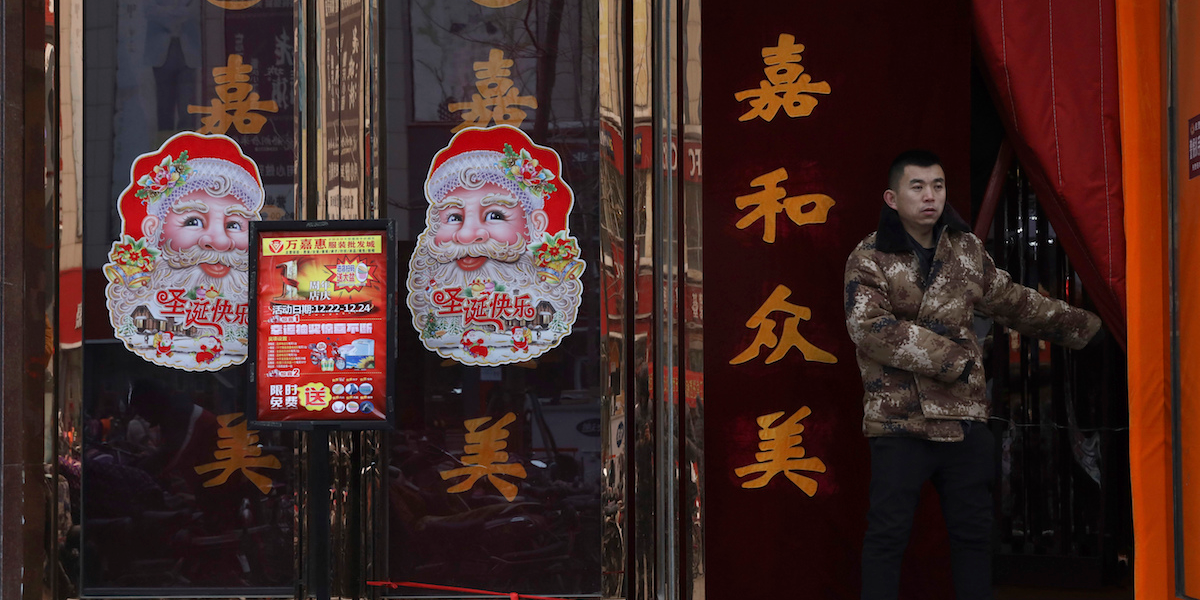- Many citizens and businesses around China have reportedly been forbidden to celebrate or put up decorations for Christmas this year.
- Local authorities appear to be following President Xi Jinping’s burgeoning war against religion and what it considers foreign influences.
- China’s Communist Party is officially atheist and is increasingly clamping down on religion to assert its dominance.
Local authorities in China have reportedly forbidden businesses and citizens from celebrating Christmas this year, likely as part of President Xi Jinping’s war against religion and foreign culture.
Officials in at least four cities and one county have ordered restrictions on Christmas decorations, with at least ten schools asked to curtail their Christmas celebrations, The Associated Press (AP) reported on Monday.
Like many other Asian countries, China does not officially mark Christmas a public holiday, with workers given days off on to celebrate events like Chinese New Year instead. Many Chinese businesses tend to use Christmas to encourage people to go shopping instead.
The latest regulations on Christmas decorations appear not to be a mandate from China’s central government, but a response by local governments against the Communist Party’s burgeoning war against religion and foreign culture.

No decorations, no Christmas hats, and no sales
Workers at a 27-story shopping and office complex in Nanyang, a city in southwestern China, dismantled their Christmas trees, lights and bells within 24 hours of government officials telling them to take down the decorations, the AP said.
The government in Hengyang, a nearby city, said in a social media notice that anyone caught holding Christmas sales or celebrations that blocked streets would be punished, the news agency added.
Communist Party members should reject foreign festivals and become "models of adherence to Chinese traditional culture," Hengyang's government said.
And in Panlong district, southern China, police circulated a notice to hotels, bars, and internet cafes that said: "It is forbidden to hang Christmas stockings, wear Christmas hats, place Christmas trees, and so on."
However, some major cities like Beijing and Shanghai are still putting up Christmas decorations, the AP noted.

Zi Yang, a China expert at the S. Rajaratnam School of International Studies in Singapore, told the AP: "The ongoing local reaction against Christmas is part of the wider sentiment since Xi took power."
"Therefore, foreign cultural elements such as Christmas are placed on the chopping block," he said.

President Xi's war on religion
Since Xi Jinping became president in 2012, the country has ramped up its restrictions on religious symbols and what it considers elements of foreign culture in order to assert the state's dominance.
China's Communist Party, which is officially atheist, has for decades attempted to control religion by allowing five religious organizations to exist under the state's control, including a Party-sanctioned form of Catholicism and Protestantism.
Authorities have reportedly targeted Christians outside the state-sanctioned Catholic and Protestant groups by burning bibles, shutting down churches, and ordering people to renounce their faith.

This year, China has told churches to inform the government of their Christmas plans, curtail their spending on holiday expenses, and forbidden minors from participating in Christmas events, the AP quoted a California-based Chinese pastor as saying.
It's not clear whether every church in China was given the notice.
China's state-run Global Times tabloid, meanwhile, sought to downplay China's crackdown on Christmas. In an editorial published on Sunday, it described the media response to the government bans as "sensationalized" and claimed that governments were just trying to avoid "excessive commercialization."
Hu Xijin, the Global Times editor, also tweeted that the state-run People's Daily headquarters put up Christmas decorations, adding bizarrely: "I wonder if the New York Times has Chinese elements during the Spring Festival in its New York office."
China is estimated to hold one of the world's largest Christian populations with more than 100 million observing the religion.

